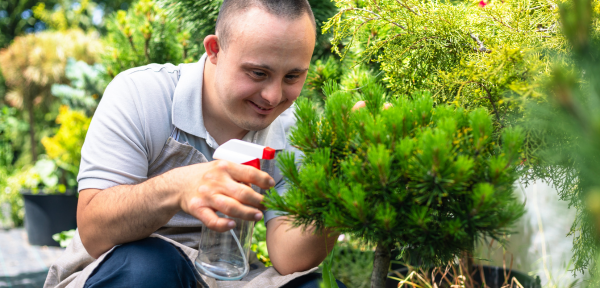Greening services for persons with disabilities: EASPD reports on promising practices

Climate change is one of the most challenging issues that our contemporary society is facing. Marginalised and vulnerable groups, which include persons with disabilities, are at risk of being the most seriously affected by the consequences of this crisis. Now more than ever it is important to push for a transformation towards greener economies, all while making sure that this transition is inclusive and leaves no one behind. The green transition should represent an empowerment opportunity for persons with disabilities, increasing their awareness about sustainability issues and in turn allowing them to actively and autonomously contribute to the protection of the environment. Service providers play a crucial role in the realisation of the policy objectives set out by the European Green Deal of 2020, which aim at reducing gas emissions by 55% by 2035 and at achieving carbon neutrality by 2050 while ensuring a just transition that leaves no one behind. As a result, care and support services need to transform and adapt to the ever-changing needs of the present and the future, while also making sure that the vulnerable groups that rely on them for support are included in the process.
In this context, EASPD has published a report that highlights 11 promising practices carried out by social service providers for persons with disabilities from Spain, Greece, Austria, France, Finland, Malta, Israel, and a European project. The report acknowledges that service providers have the potential to enable an inclusive green transition and aims at facilitating the exchange of experiences and good practices, as well as to create a strong evidence base for future action.
The best-case practices showcased in the report have been selected according to three criteria:
- First, the practices are sustainable, tackle issues related to climate change, and aim at empowering persons with disabilities in the green transition.
- Second, they are the result of a co-design that takes into account the opinions, needs and wishes of people with disabilities.
- Finally, the practices are in line with the UN Convention on the Rights of Persons with Disabilities (UNCRPD), which stresses the importance of respecting people with disabilities’ freedom of choice and their right to have control over their lives.
The practices collected and presented in the report demonstrate that greening services is possible and that, for people with disabilities to be actively engaged in the green transition, it is essential to allow them to make informed climate-friendly decisions. This goal can be reached through several different strategies, among which training on green skills for persons with disabilities, ad hoc training programmes for social services professionals and architectural intelligence for making living facilities accessible and green.
To read more about the promising practices highlighted in EASPD’s report on the greening of services, please click here.

